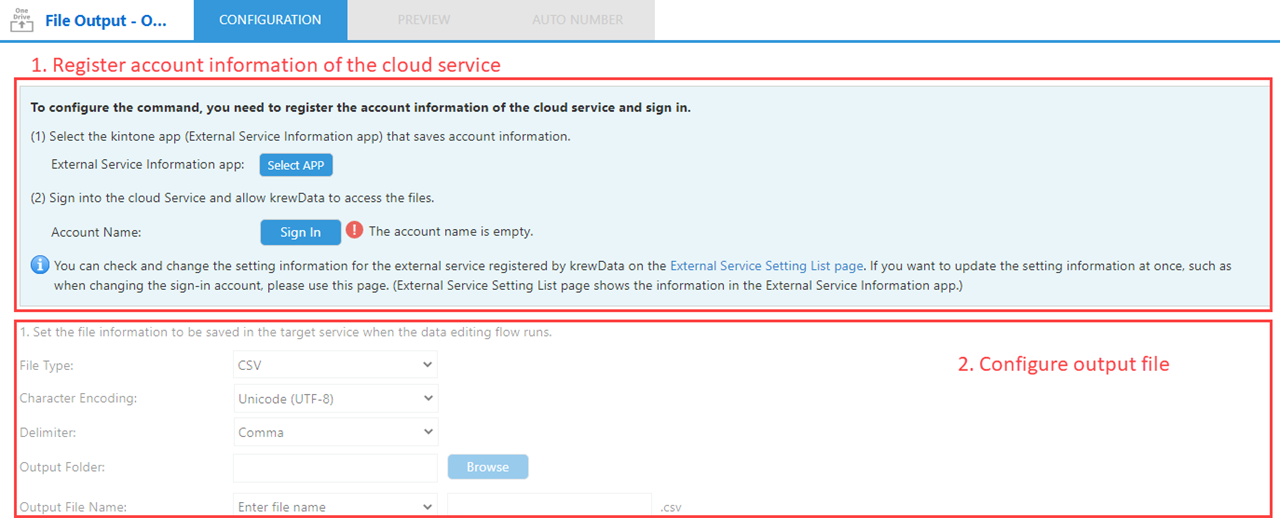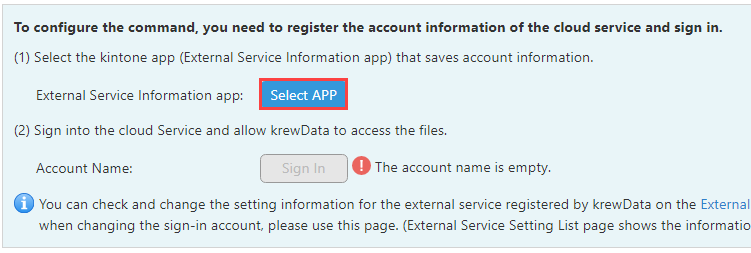![]()
![]()
![]()
![]()
The File Output command outputs the result data of the data editing flow to an Excel and CSV file in the cloud storage.
The data editing flow should always be ended with the output app command, but the file output command is treated in the same way. So, there is no problem if there is one or more file output commands in the data editing flow, even when the output app command does not exist.
 |
For cloud services like Google Drive, you must set them up on Google in advance. For details, see Using Google Drive. |
In order to set the File Output command, follow these steps. These settings are set on the Settings tab of the File Output command.

- Register account information of the cloud service
Create an External Service Information App that saves the account information of the cloud service used when setting commands and executing the data editing flow, and register the account information. You can refer the registered account information on the External Service Setting List. - Configure output file
Set the file to be output by the command and the output method such as the output field and record output order.
1. Register Account Information of Cloud Service
In order to set the command, you must register and sign into the linked cloud service.
(1) Create kintone app (External Service Information App) that saves account information
This step is only required when you are using the File Input or File Output commands for the first time in Plug-in setting page. Note: you do not need to perform this step if the app name appears instead of the Select APP button in the External Service Information App.
a. Click the Select APP button of External Service Information App.
b. Create an external service information app by clicking Create service setting management app in the app selection dialog, entering the name in the APP Name field, and clicking the OK button.
c. Click the OK button after selecting the external service information application created in the application selection dialog.
(2) Sign into the cloud Service and allow krewData to access the files.
a. Click the Sign in button of Account Name.
b. Sign into cloud service's account / password on the sign-in screen.
 |
|
2. Configure Output File
Set the output file name, output method and filtering conditions. In the Settings section, you will find more information about setting options.
1. Set the file information to be saved in the target service when the data editing flow runs.
| Settings | Description | ||
|---|---|---|---|
| File Type |
Select the file type to output.
|
||
| Character Encoding |
Select the character encoding of the CSV file.
|
||
| Delimiter |
Select the delimiter of the CSV file.
|
||
| Output Folder | Click the Browse button and select the cloud storage folder where you want to save the file. | ||
| Output File Name |
Specify the file name to save in the output folder.
|
||
| Output method |
Select the output method.
|
2. Select fields of data editing flow to output and set output order.
| Settings | Description |
|---|---|
| Fields of data editing flow to output | Select the field of result data of the data editing flow to output to the file. |
| Record Output Order | Specify the order of records output to the file by using sort conditions. |
| Table record Output Order | Specify the order of table records output to the file by using sort conditions |
For more information about the auto number, refer to Auto Number.
There is a limit to the number of files to output and the size of the file when the data editing flow is executed. For more information, refer to Upper Limits.

